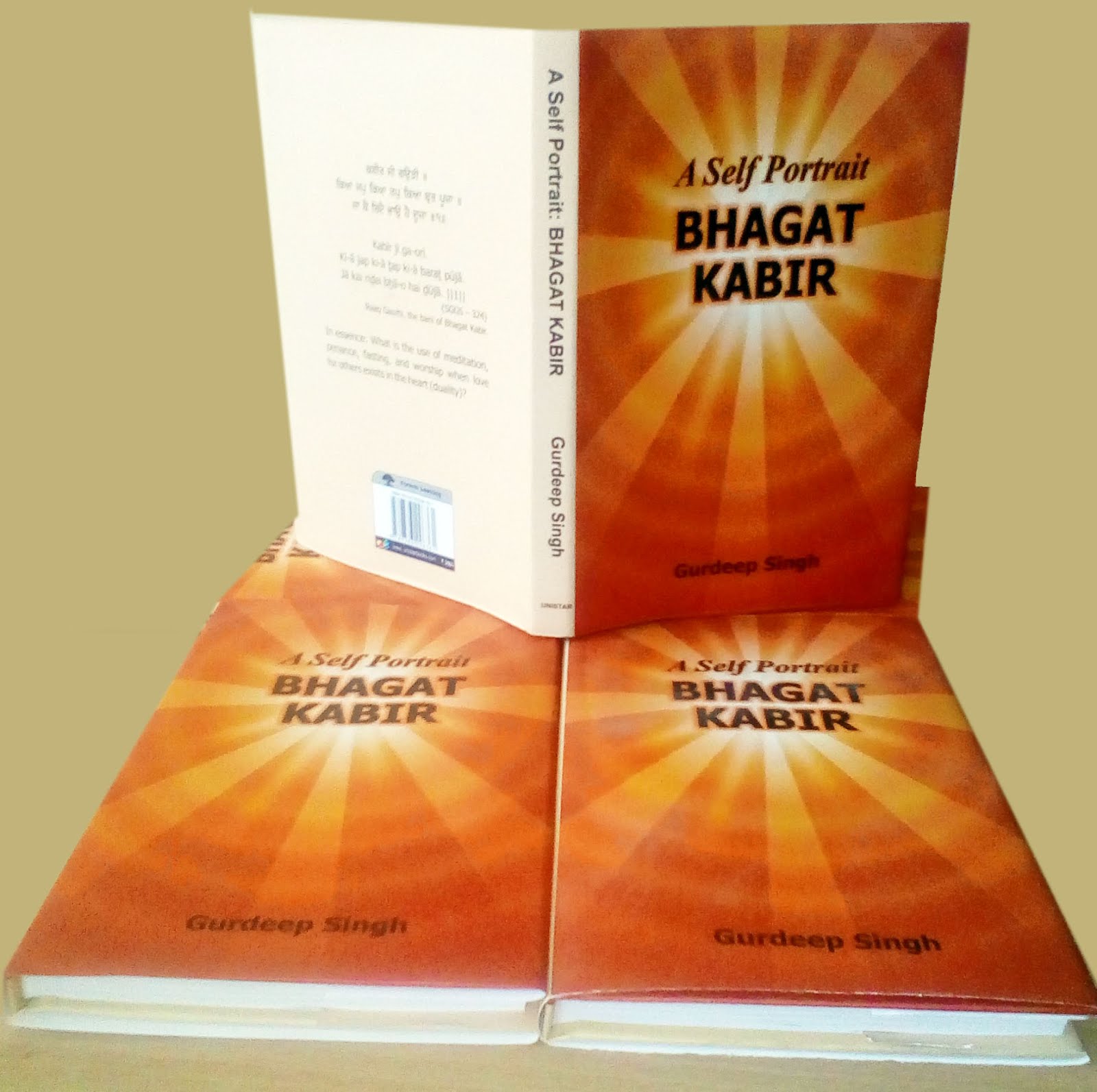20180630
Ramkli Mehla 1, Dakhni, Onkaar
In the coming months, we will go slowly through the Bani “Onkaar” which is advised to be sung in Ramkli Dakhni; we will ponder over what Guru Nanak ji has shared with us about the all pervading Creator he has defined in a prelude to his bani: Japji”. From stanza 1 to 8, the main idea the Guru passes on to us is that Onkaar” is the all-pervading Creator and He cannot be established in an idol; He is present in every form and beyond. His lights is all over. As long as the man remains saturated in the Maya pursuits triggered by his conceit, he remains in miseries and fails to obtain stable happiness. Our all pervading Creator is realized only through the Satiguru, who has realized His oneness. Thus through the true Guru, the Guru’s follower prioritizes becoming one with Him while living right in the Maya. After reading this, a true Sikh rejects all kinds of rituals, and takes refuge only in the Guru and the Creator. What kind of the Guru a seeker needs to have? The Guru explains it on 686, SGGS:
ਸੋ ਗੁਰੁ ਕਰਉ ਜਿ ਸਾਚੁ ਦ੍ਰਿੜਾਵੈ ॥ ਅਕਥੁ ਕਥਾਵੈ ਸਬਦਿ ਮਿਲਾਵੈ ॥
ਹਰਿ ਕੇ ਲੋਗ ਅਵਰ ਨਹੀ ਕਾਰਾ ॥ ਸਾਚਉ ਠਾਕੁਰੁ ਸਾਚੁ ਪਿਆਰਾ ॥੨॥
So gur kara-o jė sācẖ ḏariṛ-āvai . Akath kathāvai sabaḏ milāvai.
Har ke log avar nahī kārā . Sācẖa-o ṯẖākur sācẖ pi-ārā. ||2||
In essence: I shall adopt that Guru, who implants Har in my mind and whose teachings enable me to express Har, the inexpressible. Har’s devotees have no other task than doing Har’s devotion, because their Master, who is eternal, is dear to them.
Now let us ponder over the bani, Onkaar:
ਰਾਮਕਲੀ ਮਹਲਾ ੧ ਦਖਣੀ ਓਅੰਕਾਰੁ
Rāmkalī mėhlā 1 ḏakẖ-ṇī o-ankār
Raag Ramkali, the bani of First Nanak; (in measure) Dhakhni, “Onkaar”
ੴ ਸਤਿਗੁਰ ਪ੍ਰਸਾਦਿ ॥
Ik-oaʼnkār saṯgur parsāḏ.
There is only One All Pervading Akalpurakh, who is known with the blessings of the Satiguru.
ਓਅੰਕਾਰਿ ਬ੍ਰਹਮਾ ਉਤਪਤਿ ॥ ਓਅੰਕਾਰੁ ਕੀਆ ਜਿਨਿ ਚਿਤਿ ॥
ਓਅੰਕਾਰਿ ਸੈਲ ਜੁਗ ਭਏ ॥ ਓਅੰਕਾਰਿ ਬੇਦ ਨਿਰਮਏ ॥
ਓਅੰਕਾਰਿ ਸਬਦਿ ਉਧਰੇ ॥ ਓਅੰਕਾਰਿ ਗੁਰਮੁਖਿ ਤਰੇ ॥
ਓਨਮ ਅਖਰ ਸੁਣਹੁ ਬੀਚਾਰੁ ॥ ਓਨਮ ਅਖਰੁ ਤ੍ਰਿਭਵਣ ਸਾਰੁ ॥੧॥
O-ankār barahmā uṯpaṯ. O-ankār kī-ā jin cẖiṯ.
O-ankār sail jug bẖa-e. O-ankār beḏ nirma-e.
O-ankār sabaḏ uḏẖre. O-ankār gurmukẖ ṯare.
Onam akẖar suṇhu bīcẖār. Onam akẖar ṯaribẖavaṇ sār. ||1|| {SGGS- 929 - 930}
In essence: Onkaar (Ekankar) created Brahama; Brahama cherished Him in his mind. The entire world and the time difference of yuga have existed because of Him. From Onkaar, the Vedas came in to existence. Through Onkaar, the world was saved through the Shabda (of Onkaar). Through Onkaar, the Guru’s followers were saved. Oh Pundit! Listen and ponder over the word “onam” you write. He, “ onam”, is the essence of the three worlds (Therefore you should use the word “onam” for Onkaar, who is not at a place but all over).
The Guru is addressing those people who write “onam nameh” for idols; he makes it clear that Brahma known as a Devta was a creation of Onkaar (Ekankar) and he also kept Onkaar in his mind; obviously Brahma didn’t create anything. The entire world, the ages, the Vedas were in existence because of Ekankar. There was the Shabda about Onkaar (the Guru’s guidance given by Onkaar) through which many were saved; therefore, it is important to know who is that to whom you call “onam nameh/greeting to Onam” The Guru answers: Okraar is the creator and source of all; therefore, it is Onkaar who should be revered instead of the idols. First Nanak renamed “Onkaar” as “Ekankar” in the beginning of his bani “Jap”. The Guru also names “Onkaar” as “Ekankar” in the stanza number five of this bani, “Onkaar”.
ਸੁਣਿ ਪਾਡੇ ਕਿਆ ਲਿਖਹੁ ਜੰਜਾਲਾ ॥
ਲਿਖੁ ਰਾਮ ਨਾਮ ਗੁਰਮੁਖਿ ਗੋਪਾਲਾ ॥੧॥ ਰਹਾਉ ॥
Suṇ pāde ki-ā likẖahu janjālā.
Likẖ rām nām gurmukẖ gopālā. ||1|| Rahā-o.
In essence: Oh Pundit! Why to write this worldly puzzle? Follow the Guru and write only the name of Ekankar, who is all pervading and the cherisher of the world. Pause.
ਸਸੈ ਸਭੁ ਜਗੁ ਸਹਜਿ ਉਪਾਇਆ ਤੀਨਿ ਭਵਨ ਇਕ ਜੋਤੀ ॥
ਗੁਰਮੁਖਿ ਵਸਤੁ ਪਰਾਪਤਿ ਹੋਵੈ ਚੁਣਿ ਲੈ ਮਾਣਕ ਮੋਤੀ ॥
ਸਮਝੈ ਸੂਝੈ ਪੜਿ ਪੜਿ ਬੂਝੈ ਅੰਤਿ ਨਿਰੰਤਰਿ ਸਾਚਾ ॥
ਗੁਰਮੁਖਿ ਦੇਖੈ ਸਾਚੁ ਸਮਾਲੇ ਬਿਨੁ ਸਾਚੇ ਜਗੁ ਕਾਚਾ ॥੨॥
Sasai sabẖ jag sahj upā-i-ā ṯīn bẖavan ik joṯī.
Gurmukẖ vasaṯ parāpaṯ hovai cẖuṇ lai māṇak moṯī.
Samjẖai sūjẖai paṛ paṛ būjẖai anṯ niranṯar sācẖā.
Gurmukẖ ḏekẖai sācẖ samāle bin sācẖe jag kācẖā. ||2||
In essence : (letter “sassa”) In the three worlds, only Onkaar’s light pervades. Through the Guru, the valuable (His) name-pearl is obtained. One who understands it by reading and reflecting on the Guru’s thoughts understands that Onkaar permeates all. The Guru’s follower sees Him and clings to Him realizing that except Him, the world is perishable.
ਧਧੈ ਧਰਮੁ ਧਰੇ ਧਰਮਾ ਪੁਰਿ ਗੁਣਕਾਰੀ ਮਨੁ ਧੀਰਾ ॥
ਧਧੈ ਧੂਲਿ ਪੜੈ ਮੁਖਿ ਮਸਤਕਿ ਕੰਚਨ ਭਏ ਮਨੂਰਾ ॥
ਧਨੁ ਧਰਣੀਧਰੁ ਆਪਿ ਅਜੋਨੀ ਤੋਲਿ ਬੋਲਿ ਸਚੁ ਪੂਰਾ ॥
ਕਰਤੇ ਕੀ ਮਿਤਿ ਕਰਤਾ ਜਾਣੈ ਕੈ ਜਾਣੈ ਗੁਰੁ ਸੂਰਾ ॥੩॥
Ḏẖaḏẖai ḏẖaram ḏẖare ḏẖarmā pur guṇkārī man ḏẖīrā.
Ḏẖaḏẖai ḏẖūl paṛai mukẖ masṯak kancẖan bẖa-e manūrā.
Ḏẖan ḏẖarṇīḏẖar āp ajonī ṯol bol sacẖ pūrā.
Karṯe kī miṯ karṯā jāṇai kai jāṇai gur sūrā. ||3||
In essence: (letter “dhadha”) A meritorious person in a Satsang preaches virtues with his/her steadfast mind. If one stays humble among the Sants, one’s hard feelings turn into virtues. The supporter of the earth, Akalpurakh, is beyond birth; His speech (Will) is perfect. Only the Creator knows what His extent is, or the valiant Guru knows it.
ਙਿਆਨੁ ਗਵਾਇਆ ਦੂਜਾ ਭਾਇਆ ਗਰਬਿ ਗਲੇ ਬਿਖੁ ਖਾਇਆ ॥
ਗੁਰ ਰਸੁ ਗੀਤ ਬਾਦ ਨਹੀ ਭਾਵੈ ਸੁਣੀਐ ਗਹਿਰ ਗੰਭੀਰੁ ਗਵਾਇਆ ॥
ਗੁਰਿ ਸਚੁ ਕਹਿਆ ਅੰਮ੍ਰਿਤੁ ਲਹਿਆ ਮਨਿ ਤਨਿ ਸਾਚੁ ਸੁਖਾਇਆ ॥
ਆਪੇ ਗੁਰਮੁਖਿ ਆਪੇ ਦੇਵੈ ਆਪੇ ਅੰਮ੍ਰਿਤੁ ਪੀਆਇਆ ॥੪॥
Ńi-ān gavā-i-ā ḏūjā bẖā-i-ā garab gale bikẖ kẖā-i-ā.
Gur ras gīṯ bāḏ nahī bẖāvai suṇī-ai gahir gambẖīr gavā-i-ā.
Gur sacẖ kahi-ā amriṯ lahi-ā man ṯan sācẖ sukẖā-i-ā.
Āpe gurmukẖ āpe ḏevai āpe amriṯ pī-ā-i-ā. ||4||
In essence: Those, who lose the Guru’s guidance and follow others’ guidance, petrify in pride and eat poison (of Maya influences). They don’t like to hear the hymens in Ekankar’s praise, and they lose Him who is the profound and unfathomable. The souls and bodies of those who through the Guru’s praise have found His name accept Him very pleasing. (This happens if He Wills) It is Ekankar, who brings the mortals to the Guru (a valiant one); He blesses them to have His praise-nectar
ਏਕੋ ਏਕੁ ਕਹੈ ਸਭੁ ਕੋਈ ਹਉਮੈ ਗਰਬੁ ਵਿਆਪੈ ॥
ਅੰਤਰਿ ਬਾਹਰਿ ਏਕੁ ਪਛਾਣੈ ਇਉ ਘਰੁ ਮਹਲੁ ਸਿਞਾਪੈ ॥
ਪ੍ਰਭੁ ਨੇੜੈ ਹਰਿ ਦੂਰਿ ਨ ਜਾਣਹੁ ਏਕੋ ਸ੍ਰਿਸਟਿ ਸਬਾਈ ॥
ਏਕੰਕਾਰੁ ਅਵਰੁ ਨਹੀ ਦੂਜਾ ਨਾਨਕ ਏਕੁ ਸਮਾਈ ॥੫॥
Ėko ek kahai sabẖ ko-ī ha-umai garab vi-āpai.
Anṯar bāhar ek pacẖẖāṇai i-o gẖar mahal siñāpai.
Parabẖ neṛai har ḏūr na jāṇhu eko sarisat sabā-ī.
Ėkankār avar nahī ḏūjā Nānak ek samā-ī. ||5||
In essence: All people say Ekankar is but one; however, they are engrossed in conceit (They need to understand His all pervading existence). (In fact) if one realizes that Ekankar is the same who pervades in and out, one can find His abode within (not by merely saying but seeing Him all over); He is very close; do not consider Him away as He pervades the entire world. Oh Nanak! There is none other than “Ekankar”, who is present everywhere.
ਇਸੁ ਕਰਤੇ ਕਉ ਕਿਉ ਗਹਿ ਰਾਖਉ ਅਫਰਿਓ ਤੁਲਿਓ ਨ ਜਾਈ ॥
ਮਾਇਆ ਕੇ ਦੇਵਾਨੇ ਪ੍ਰਾਣੀ ਝੂਠਿ ਠਗਉਰੀ ਪਾਈ ॥
ਲਬਿ ਲੋਭਿ ਮੁਹਤਾਜਿ ਵਿਗੂਤੇ ਇਬ ਤਬ ਫਿਰਿ ਪਛੁਤਾਈ ॥
ਏਕੁ ਸਰੇਵੈ ਤਾ ਗਤਿ ਮਿਤਿ ਪਾਵੈ ਆਵਣੁ ਜਾਣੁ ਰਹਾਈ ॥੬॥
Is karṯe ka-o ki-o gėh rākẖa-o afri-o ṯuli-o na jā-ī.
Mā-i-ā ke ḏevāne parāṇī jẖūṯẖ ṯẖag-urī pā-ī.
Lab lobẖ muhṯāj vigūṯe ib ṯab fir pacẖẖuṯā-ī.
Ėk sarevai ṯā gaṯ miṯ pāvai āvaṇ jāṇ rahā-ī. ||6||
In essence: How can I hold on to Akalpurakh (who resides within and who is very close)? He is unapprehending and immeasurable. (Why can He not be kept in the heart?) The mortal is crazy for Maya, and its false attraction keeps him in control; his dependency on greed and avarice remains active; in the end, he will repent. If he serves only Akalpurakh, he can understand and value Him; he can end his coming and going.
The cause of our inability to hold Him in our hearts is our Maya pursuits
ਏਕੁ ਅਚਾਰੁ ਰੰਗੁ ਇਕੁ ਰੂਪੁ ॥ ਪਉਣ ਪਾਣੀ ਅਗਨੀ ਅਸਰੂਪੁ ॥
ਏਕੋ ਭਵਰੁ ਭਵੈ ਤਿਹੁ ਲੋਇ ॥ ਏਕੋ ਬੂਝੈ ਸੂਝੈ ਪਤਿ ਹੋਇ ॥
ਗਿਆਨੁ ਧਿਆਨੁ ਲੇ ਸਮਸਰਿ ਰਹੈ ॥ ਗੁਰਮੁਖਿ ਏਕੁ ਵਿਰਲਾ ਕੋ ਲਹੈ ॥
ਜਿਸ ਨੋ ਦੇਇ ਕਿਰਪਾ ਤੇ ਸੁਖੁ ਪਾਏ ॥ ਗੁਰੂ ਦੁਆਰੈ ਆਖਿ ਸੁਣਾਏ ॥੭॥
Ėk acẖār rang ik rūp. Pa-uṇ pāṇī agnī asrūp.
Ėko bẖavar bẖavai ṯihu lo-e. Ėko būjẖai sūjẖai paṯ ho-e.
Gi-ān ḏẖi-ān le samsar rahai. Gurmukẖ ek virlā ko lahai.
Jis no ḏe-e kirpā ṯe sukẖ pā-e. Gurū ḏu-ārai ākẖ suṇā-e. ||7||
In essence: He alone pervades the different forms and acts alone. He acts through air, water, and fire. Only He exists through out the entire world. If one perceives only Ekankar all over and remains stilled with this divine knowledge, only then one gets honored (by Ekankar). Very rare is such a Guru’s follower. (Actually) Only those who are showered with His grace remain in such stable peace. Through the Guru, Ekankar states about Himself (of His being one and all pervading).
The Guru keeps telling the pundit that “Onam nameh” should be used for our Ekankar, who is all pervading, not for the idol installed in the Onkaar Mandir (in the South; daccan).
ਊਰਮ ਧੂਰਮ ਜੋਤਿ ਉਜਾਲਾ ॥ ਤੀਨਿ ਭਵਣ ਮਹਿ ਗੁਰ ਗੋਪਾਲਾ ॥
ਊਗਵਿਆ ਅਸਰੂਪੁ ਦਿਖਾਵੈ ॥ਕਰਿ ਕਿਰਪਾ ਅਪੁਨੈ ਘਰਿ ਆਵੈ ॥
ਊਨਵਿ ਬਰਸੈ ਨੀਝਰ ਧਾਰਾ ॥ ਊਤਮ ਸਬਦਿ ਸਵਾਰਣਹਾਰਾ ॥
ਇਸੁ ਏਕੇ ਕਾ ਜਾਣੈ ਭੇਉ ॥ ਆਪੇ ਕਰਤਾ ਆਪੇ ਦੇਉ ॥੮॥
Ūram ḏẖūram joṯ ujālā. Ŧīn bẖavaṇ mėh gur gopālā.
Ūgvi-ā asrūp ḏikẖāvai. Kar kirpā apunai gẖar āvai.
Ūnav barsai nījẖar ḏẖārā. Ūṯam sabaḏ savāraṇhārā.
Is eke kā jāṇai bẖe-o. Āpe karṯā āpe ḏe-o. ||8||
In essence: The great Cherisher (Ekankar) exists in the entire world. His light illumines throughout the ocean and the earth. When with His grace He shows a person that He Himself is pervading all over, his/her mind stills within. Then Akalpurakh through the Guru’s Shabda starts making the ambrosial rain falling within; thus he/she knows the secret of His being the creator, who Himself is the Guru.
CONTINUES:......
Wishes
Labels:
GURMAT VICHAR
Subscribe to:
Posts (Atom)









